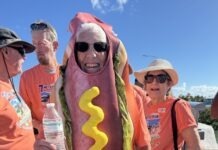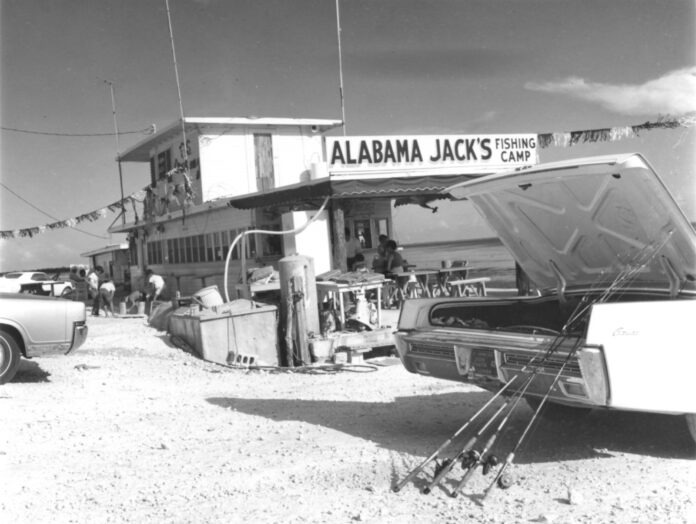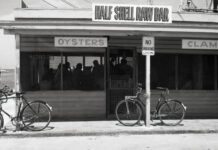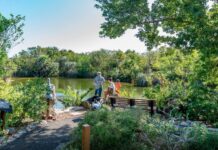Two roads lead in and out of Key Largo: the old railroad route and the old highway route. Eventually, both connect to the Overseas Highway, the asphalt conduit bridging mainland Florida and Key West.
For those interested in getting to where they are going as quickly as possible, and judging by how most people seem to drive on the highway, the old railroad route is the one most people take. It follows the 18-Mile Stretch carved out by those working for Henry Flagler while building the Key West Extension of his Florida East Coast Railway.
The Stretch connects to the Overseas Highway at the Monroe County line, around MM 115, rolls over the Jewfish Creek Bridge and onto the island. The alternative is taking Card Sound Road and following the original path of State Road 4A, the first Overseas Highway that opened to traffic in 1927. It takes longer unless you’re headed to North Key Largo, Ocean Reef or the Anglers Club. For those people, it is a shortcut.
These days, it is the path less traveled and shamefully overlooked. While it is not the most direct route, it is a scenic drive through a picturesque setting. Also, it passes one of Monroe County’s classic dive bars, a local fixture known for more than 50 years as Alabama Jack’s.
The bar is named after Jack Stratham, born circa 1901 in Sumter County, Georgia, somewhere between Columbus and Americus. He made his living working in construction around the world. He helped to build a light plant in Moscow and the first South American oil refinery “that was for a British company, in Colombia.” He worked as a riveter when the Empire State Building was being built in New York City and on the city’s water pipelines “that started at Flatbush, went over the river, under the river, through Harlem and over to Yankee Stadium.”
While many stories are told about him (and some about his pet raccoon, Coonie), the April 18, 1971, edition of the Miami Herald tells a story about Alabama Jack. Too often, stories about the good old days are just that — stories about someone (Stratham) but not told by that someone (Stratham). This rare document provided quotes and pictures of Stratham and Coonie.
How did a Georgia boy become known as Alabama Jack? Apparently, several Jacks were working on a construction job, and because of the southern tones of his accent, the foreman nicknamed him Alabama Jack. How he found his way to Monroe County is a familiar story. It started in 1924 when he came to South Florida for a two-week vacation. An avid fisherman, he never forgot the local waters. By 1937, he was coming back every winter.
In the early 1940s, he bought a little place, moved to the area full-time, and spent a great deal of time fishing. One day, when he stopped at a gas station, the attendant noticed the fishing gear in Jack’s car. He said to Stratham, “I’ll tell you about the best place…”
That place turned out to be Card Sound, where Stratham bought the lease to just under an acre of right-of-way from a Miami plumber in 1953. “I bought the place first as more or less a party place, a place to entertain our friends.”
He acquired a small, abandoned railroad building used before the 1935 Labor Day Hurricane ended the run of the Over-Sea Railroad. He set it on pilings so that part of it stood over the water. He anchored it down and installed jalousie windows, doors and counters. He also built docks.
As word of the excellent fishing around Card Sound spread, Alabama Jack’s grew, and as hurricanes came and went, damaging his building, he always rebuilt. In 1965, “I had just finished work on two 16-by-16 rooms that summer. We moved in king-sized beds that hadn’t even been slept in.” When Hurricane Betsy stormed through, it knocked his building off its original pilings; he lost the two rooms, both mattresses, a barge with 18 new motors strapped to it, and hundreds of feet of docks. When it was over, he was left with two side walls, part of a roof, and some of the floor. Stratham bought a barge, rebuilt Alabama Jack’s on top of it, and reopened in March 1966.
The bar has been a Monroe County fixture ever since, in good times and bad. It was not the only business operating in that Card Sound community, one that has been described as a relative no-man’s land. At its peak, the community of about 100 people was largely squatters who built homes and scratched out a way of life fishing, selling blue crabs, running a bar or a fish camp and doing anything they could.
All of it encroached on a sliver of right-of-way that had been built up to support the road during the construction of State Road 4A with feet in both Dade and Monroe counties. For decades, the community was largely left to its own devices. One thing that set Alabama Jack’s apart from the vast majority of the others along Card Sound Road was ownership.
Stratham had a lease with Monroe County and the state for $300 a month. In 1971, it was extended for 10 years with an option to renew. Also, he had his wife, Alice. Alabama Jack’s was not the only place to rent a boat to go out fishing or grab a beer, but it was the only one offering Alice’s cooking. Once upon a time, her lima bean soup and crab cakes were legendary.
Twenty years after building the first Alabama Jack’s, Stratham sold the property. He died in 1977; Alabama Jack Stratham was 76 years old. Though the man has moved on, his legend and bar have lived on through better and worse. Those stories will be continued next week.























